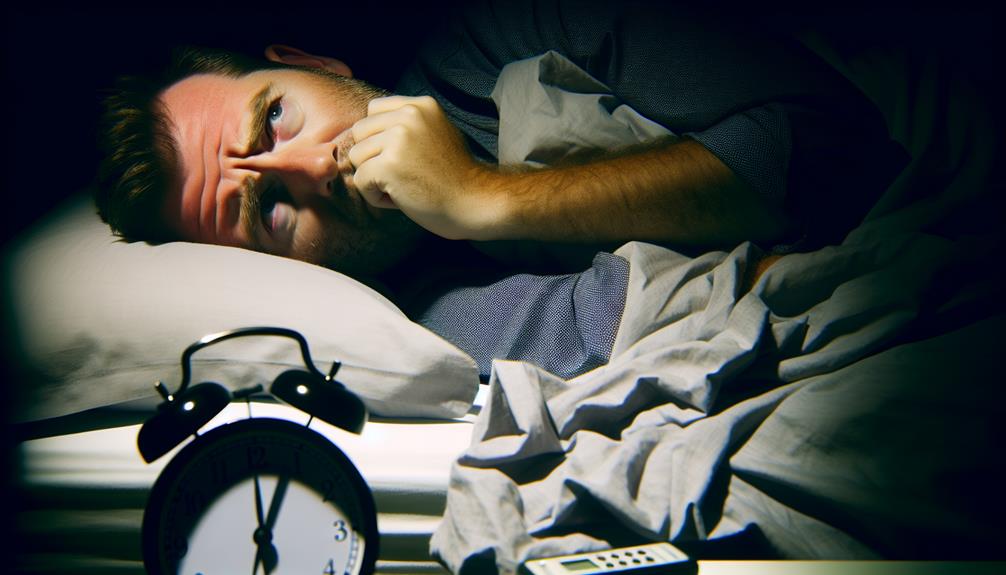If you're experiencing symptoms of hormonal imbalance, it may impact various aspects of your health. I've seen men struggle with chronic fatigue, unexpected weight changes, and sleep disturbances, all potentially linked to low testosterone or elevated cortisol. Mood swings and irritability often accompany these issues, reflecting emotional instability. Additionally, decreased libido and sexual dysfunction can arise, complicating personal relationships. Cognitive difficulties like poor concentration and increased anxiety frequently emerge too. Recognizing these signs is essential for addressing the imbalance, and there's more to uncover about effective management and treatment options available.
Fatigue and Lack of Energy

Many men experience fatigue and a lack of energy at some point in their lives, and it often goes unrecognized as a symptom of hormonal imbalance. This chronic exhaustion can markedly impact daily functioning and overall quality of life. When I first noticed my decreasing energy levels, I attributed it to stress or simply aging. However, I later learned that hormonal fluctuations, particularly in testosterone, can play a fundamental role in how energized I feel.
Testosterone is essential for maintaining muscle mass, motivation, and energy. When its levels drop, men may find themselves struggling with persistent fatigue that doesn't improve with rest. This isn't just about feeling tired after a long day; it's a deep-seated weariness that can affect mental clarity and emotional well-being.
Interestingly, research indicates that low testosterone levels are correlated with increased fatigue in men, leading to a cycle where reduced energy levels discourage physical activity, further exacerbating the issue. Hormonal imbalances can also cause sleep disturbances, which compound feelings of exhaustion.
Recognizing the signs of hormonal imbalance is essential. If you're experiencing chronic exhaustion despite a healthy lifestyle, consider discussing these symptoms with a healthcare provider. Understanding the underlying causes can lead to effective treatment options, improving energy levels and enhancing your overall vitality. Ignoring these symptoms could prolong the discomfort and impact your life quality, so it's critical to address them proactively.
Changes in Weight
Changes in weight can be a subtle yet significant indicator of hormonal imbalance in men. I've noticed that when my hormones are out of sync, I experience unexpected weight fluctuations—either gaining or losing pounds without changing my diet or exercise routine. This can often be traced back to hormonal levels, particularly testosterone and cortisol.
Testosterone plays a vital role in regulating metabolism and body composition. When testosterone levels decline, I find it harder to maintain muscle mass, which can lead to an increase in body fat. Conversely, elevated cortisol levels, often associated with stress, can trigger metabolic changes that promote fat storage, especially around the abdominal area. It's frustrating to see my weight shift so dramatically due to factors I can't easily control.
Moreover, these weight fluctuations aren't merely cosmetic; they can indicate deeper metabolic changes that affect my overall health. For instance, a sudden weight gain can lead to insulin resistance, which increases the risk of developing type 2 diabetes. Similarly, unexplained weight loss can signal other underlying health issues that could stem from hormonal imbalances.
Keeping track of my weight and understanding how it correlates with my overall hormonal health has become essential. If I notice significant changes, I know it's time to consult a healthcare professional. They can help identify the specific hormonal issues at play and guide me towards effective management strategies. Awareness of these changes is vital for taking proactive steps to restore balance in my body.
Mood Swings and Irritability

Experiencing mood swings and irritability can be a telling sign of hormonal imbalances in men, often manifesting when levels of testosterone and other hormones fluctuate. I've noticed that my emotional stability can be severely affected during these hormonal shifts, leading to feelings of anger or sadness that seem to arise without clear reason.
When I reflect on my experiences, I realize that certain irritability triggers seem to exacerbate these mood fluctuations. Stressful situations, lack of sleep, or even dietary choices can amplify emotional instability, making it challenging to manage my reactions effectively. This interplay between hormones and external factors often leaves me feeling overwhelmed and out of control.
The relationship between testosterone levels and mood is particularly important. As testosterone declines, I've observed how my ability to cope with daily stressors diminishes, and I find myself more easily irritated by minor inconveniences. This irritability can strain relationships, as loved ones may not understand the underlying hormonal shifts contributing to my behavior.
Recognizing these patterns has been essential for me. Identifying potential irritability triggers empowers me to take proactive steps, such as improving my sleep hygiene, engaging in regular exercise, and practicing mindfulness techniques. By addressing these factors, I can better navigate the emotional turbulence that hormonal imbalances often bring. Understanding the role of hormones in my mood swings has been a critical part of managing my overall well-being.
Decreased Libido and Sexual Dysfunction
A noticeable decline in libido can be one of the most distressing symptoms of hormonal imbalance in men. It often correlates with fluctuating testosterone levels, which play an essential role in regulating sexual desire. When testosterone levels drop, many men experience not only a lack of interest in sexual activity but may also face erectile dysfunction, further complicating the issue.
Understanding the relationship between testosterone levels and sexual health is significant. For instance, lower testosterone can diminish not just libido but also the quality of erections. Here's a concise overview of how hormonal imbalance can manifest:
| Symptom | Description |
|---|---|
| Decreased Libido | Significant reduction in sexual desire |
| Erectile Dysfunction | Difficulty achieving or maintaining an erection |
| Mood Changes | Increased irritability or anxiety |
| Fatigue | Persistent tiredness that affects daily life |
If you're experiencing these symptoms, it's essential to consult a healthcare professional. They can assess your testosterone levels and recommend appropriate interventions, whether lifestyle changes, hormone replacement therapy, or other treatments. Remember, addressing hormonal imbalance isn't just about restoring libido; it's about improving overall quality of life and emotional well-being. Don't hesitate to reach out for help—it's a significant step toward reclaiming your sexual health.
Sleep Disturbances

While many might not immediately connect hormonal imbalance with sleep disturbances, the relationship is quite significant. Hormones, particularly testosterone and cortisol, play a fundamental role in regulating sleep quality. As I've learned, when hormonal levels fluctuate, they can drastically affect my ability to achieve restful sleep.
Testosterone deficiency, often seen in men with hormonal imbalances, can lead to increased fatigue and reduced sleep quality. Research indicates that low testosterone levels correlate with a higher prevalence of sleep apnea, a condition that disrupts breathing during sleep and leads to fragmented rest. This means that even if I manage to fall asleep, my sleep could be repeatedly interrupted, preventing me from reaching deeper, restorative stages.
On the other hand, elevated cortisol levels, typically associated with stress, can also intrude upon my sleep patterns. High cortisol levels often manifest as increased anxiety, making it challenging to relax before bedtime. Additionally, chronic stress can lead to insomnia, further compounding the issue of hormonal regulation.
Understanding this intricate relationship between hormones and sleep is essential. If I notice disturbances in my sleep, it could be worth investigating my hormonal levels. Addressing hormonal imbalances might not only improve my sleep quality but also enhance my overall well-being. Seeking guidance from a healthcare professional can provide insights into potential treatment options, ensuring that I can reclaim the restful nights that are crucial for maintaining peak health.
Frequently Asked Questions
What Causes Hormonal Imbalance in Men?
When I think about what causes hormonal imbalance in men, stress factors and age-related changes come to mind. Chronic stress can lead to alterations in hormone production, affecting testosterone levels. Additionally, as men age, their bodies naturally produce less testosterone, which can further contribute to imbalances. It's essential to understand these underlying causes to effectively address any potential hormonal issues and maintain overall health and well-being.
How Is Hormonal Imbalance Diagnosed?
Diagnosing a hormonal imbalance often starts with a careful combination of symptom evaluation and blood tests. I've found that doctors typically assess my symptoms first, asking about any unusual changes in energy, mood, or physical health. Then, they'll analyze blood samples to measure hormone levels, pinpointing any discrepancies. This systematic approach guarantees we identify the underlying issues, paving the way for effective treatment. Knowing this process helps me feel more informed and empowered.
Can Diet Affect Hormone Levels in Men?
Absolutely, diet can greatly affect hormone levels in men. I've noticed that incorporating testosterone foods like lean meats, nuts, and leafy greens can boost hormone production. Additionally, dietary supplements such as vitamin D and zinc have shown promise in maintaining healthy testosterone levels. By making these dietary changes, I've felt more energetic and balanced. It's fascinating how what we eat plays an essential role in our hormonal health.
What Are the Treatment Options for Hormonal Imbalance?
When considering treatment options for hormonal imbalance, I've found that testosterone therapy can be effective for many. It's essential to consult with a healthcare professional to determine if it's right for you. Additionally, I've explored herbal supplements, which some believe can help regulate hormone levels naturally. However, the efficacy of these supplements can vary, so I always recommend doing thorough research and discussing options with your doctor before starting any treatment.
How Can Lifestyle Changes Improve Hormone Balance?
Did you know that nearly 50% of adults don't get enough exercise? I've found that incorporating consistent exercise routines not only boosts physical health but greatly enhances hormone balance. Additionally, effective stress management techniques—like mindfulness or yoga—can lower cortisol levels, which is essential for maintaining hormonal equilibrium. By prioritizing these lifestyle changes, I've noticed a remarkable improvement in my overall well-being and energy levels, making it an important focus for anyone seeking balance.
